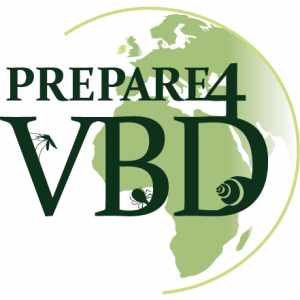PREPARE4VBD - A Cross-Disciplinary Alliance to Identify, PREdict and prePARe for Emerging Vector-Borne Diseases
Project Abstract
PREPARE4VBD builds on the conviction that a true shift in our ability for early detection, prediction and control of vector-borne diseases (VBDs) of both livestock and humans in Africa and Europe, can only come from advancing a deep cross-organismal understanding of the features that allow VBDs to persist in endemic areas. We will therefore “cast the net wide” focusing on several VBDs and vector groups to explore synergistic opportunities for integrated and cost-effective approaches to optimize surveillance, prevention and control of VBDs.
Specifically, we will address three vector groups (mosquitoes, ticks and snails) and a range of their diverse VBDs (Rift Valley Fever, ehrlichiosis, theileriosis and fasciolosis), to advance a broad, conceptual knowledge reaching beyond specific VBDs. We believe that only through a better understanding of what enables theVBDs and vectors to persist in their areas of origin, how they manage to spread or what allows some VBDs to successfully span the entire global North-South climatic gradient – will we gain the insights and actionable knowledge that enables us to predict the potential of VBDs to spread and establish in new areas.
PREPARE will establish a truly multidisciplinary network of partner institutions in Europe and Africa, including leading capacities in mosquito- tick- and snail-borne diseases of livestock and humans. The partners cover a wide range of disciplines such as vector ecology, molecular biology, bioinformatics, metagenomics, climate change and predictive spatio-temporal modelling, epidemiology and One Health. Our suggested approach is proactive, focusing on better prevention of tick-, mosquito- and snail-borne diseases of livestock and humans, by increasing disease knowledge in Africa, developing improved tools for rapid detection and state-of-art model-based surveillance for early detection and forecasting to form a blueprint for best practices for optimized VBD surveillance strategies for the targeted diseases.
Swiss TPH is responsible for leading WP2 on estimating disease risk and vector distributions and WP7 on model-based surveillance and early warning under the lead of Prof. Penelope Vounatsou, head of Biostatistics Unit. In addition, Prof. Jakob Zinsstag, Head of the Human and Animal Health Unit, engages in the capacity building and public engagement work of WP8.
Main Applicant(s)
Co Applicant(s)
Related Topics
All TopicsRelated Activities
All Activities
